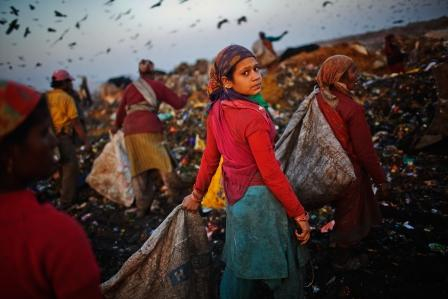
Of its more than 1.2 billion population, 900 million are undernourished, 800 million live on less than $2 (Dh7.34) a day and more than 600 million lack access to a lavatory. Add to that a high level of socio-economic inequality and India’s challenges are clear. But a committed group of millennials is combining the power of business with innovation to find solutions to specific local problems.
Although social enterprise has been around for a while — think Self-Employed Women’s Association, Just Change, Childline, Fair Trade Forum, Barefoot College and Operation Asha — there is a new-found focus on taking ownership to bring about change. Some of the areas include waste management, microfinance, providing clean energy to rural households, using performing arts and sport to impart life skills to low-income youth and engaging rural artisans to make paper out of forest waste.
An expanding number of universities including the Indian School of Business, XLRI-Xavier School of Management and the prestigious IIMs are embedding social enterprise in their curricula, while investor firms such as UnLtd India, global organisation Ashoka, Villgro and Aavishkaar are incubating and funding innovations to tackle the country’s social problems.
Gaining foothold
“The support system for entrepreneurs has increased a lot over the years,” says Debartha Banerjee, who founded Sampurn(e)arth with friends Ritvik Rao and Jayanth N.
The Mumbai-based environment solutions company promotes a decentralised approach to waste segregation, recycling dry waste and installing biogas plants to transform wet waste into cooking gas and fertiliser. Most importantly, it employs women ragpickers, offering them alternative livelihood opportunities as well as technical skills, social insurance and decent working conditions.
Theirs is one of the ventures Mumbai’s Tata Institute of Social Sciences (TISS) has funded through the Development Bank of Singapore, making social enterprise a viable career choice. “TISS’ programme has helped us immensely,” says Banerjee.
“It is easier and more socially acceptable to be a social entrepreneur. There is also a greater need now than ever.”
New business loans
In the context of creating sustainable businesses for economically disadvantaged women in Gujarat, Sheetal Mehta’s Shanti Life goes beyond microfinance — all beneficiaries also receive financial literacy training, mentoring and access to eco-sanitation facilities. “Our model of providing loans at low interest has helped many women start small businesses,” says Mehta.“Once the loan is settled, the money is recycled to the next beneficiary.
“There is an upturn in social enterprises in alleviating the country’s poverty at all levels, and that is good news.”
Ajaita Shah, meanwhile, tackles the everyday struggle of unreliable electricity and hazardous cooking practices of rural households in Rajasthan. The Founder of Frontier Markets (FM) trains locals to market, sell and service affordable solar energy products, turning the poorest of the poor into entrepreneurs. “Our target is to reach more than 400 million households,” says Shah. “Since 2011, FM has sold 86,000 products, created 500 retail points and 200 women entrepreneurs.
“Last year, it trained Solar Sahelis — women who sell our solar solutions to other women. The initiative aims to give them the opportunity to be leaders, and to earn extra money for their families.”
There are hundreds of social enterprises across India, filling the gaps between corporate moneymakers that support community initiatives, charities that depend on donations and states’ challenges to deliver on development programmes. For instance, Nisha Bora’s Elrhino makes paper from raw materials such as natural waste, elephant and rhino dung and Assam’s muga and eri silk. Vanita Kariappa uses performing arts to build skills in underprivileged children in Mumbai, while Pritham Raja gives sex trafficking survivors employment opportunities in Karnataka. Hemlata Tiwari rehabilitates beggars by organising them into professional orchestras.
Undeniably, there is an increased appetite for ethical behaviour in business, and social enterprises meet the criterion. “While entrepreneurship creates financial capital, social entrepreneurship creates social capital and brings sustainable, positive change in society,” says Banerjee.
In a country where the windfall of economic gains has helped only a few at the top, social enterprises are showing the way to empower and address the needs of those who have been overlooked.




